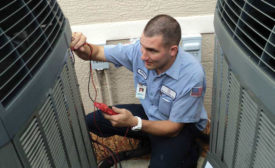Home » Department of Energy (DOE)
Articles Tagged with ''Department of Energy (DOE)''
Technologies display promise for technical and commercial impact, but are too early for private-sector investment
Read More
DOE Announces Nearly $23 Million in Funding to Bring New Solar Technologies to Market
Furthers SunShot Initiative goal to make solar fully cost-competitive with traditional forms of energy
November 27, 2015
DOE Report Says Clean Energy Technologies Are Accelerating in the US
Substantial cost reductions are continuing to drive the adoption of clean energy technologies
November 26, 2015
DOE Seeks Water Heating, Refrigeration, Sensor Solutions via JUMP Initiative
Innovative ideas sought for three campaigns
November 24, 2015
DOE Launches New Initiative to Help Cities, States Advance Building Efficiency
A select group of cities and states will receive technical assistance, participate in peer exchange
November 20, 2015
DOE Recognizes Arby’s Restaurant Group for Leadership in Energy Performance
Arby’s has committed to 20 percent energy savings over 10 years
November 16, 2015
DOE Seeks Graduate Students to Research Building to Grid Integration
Deadline for applying is Nov. 15, 2015, at 11:59 p.m. EST
November 12, 2015
State of Washington to Develop Smart Buildings, Campuses Demo
Will test transaction-based energy management
November 11, 2015
DOE Defines Zero Energy Buildings
The definition also applies to campuses, portfolios, and communities
October 26, 2015
HVAC Contractors Prepare for DOE Efficiency Mandates
Most switched to 14-plus SEER equipment ahead of DOE rules
Read More
Copyright ©2024. All Rights Reserved BNP Media.
Design, CMS, Hosting & Web Development :: ePublishing


